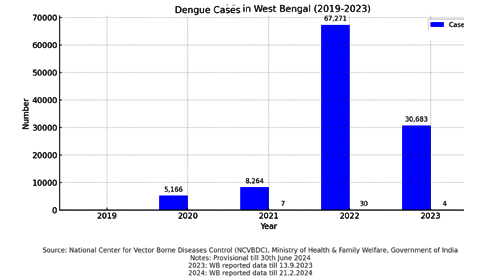
West Bengal Grapples with Dengue Crisis Amid Reporting Discrepancies
The dengue outbreak in West Bengal in 2024 can be best described as serious. According to media reports, public health professionals are concerned about the rapid surge in cases, inconsistent fatality reporting, and the state's crisis response. November 2023 reported more than 27,000 dengue cases. According to private sources, the number may exceed 28,000. This huge increase in instances during cooler months has raised questions about government initiatives, especially since data reporting isn't often correct
State recordkeeping has proven problematic. People are concerned about West Bengal's commitment to open health surveillance, given that the state has not published dengue statistics for 2019. The projected increase in cases—from 8,264 in 2021 to 67,271 in 2022—doesn't make sense compared to neighboring states, where case numbers have stayed around the same. This reporting discrepancy affects public trust and makes it harder to make positive decisions and plan for outbreaks.
The disparities in dengue death reporting are also concerning. Despite many occurrences, there have been only four deaths in 2023, compared to 30 in 2022. Experts and average people question why there is such a large difference, especially given the number of instances hasn't decreased. People have questioned the accuracy of the data and the likelihood of underreporting deaths due to uncertainty about the death toll.
Murshidabad, Malda, and North 24 Parganas are the hardest hit. Only Murshidabad has above 5,000 cases. Malda and North 24 Parganas have around 7,500 instances. Unfortunately, dengue cases have increased in Kolkata, the state capital. Some patients have dengue and malaria, making treatment harder and straining the healthcare system.
The deaths of Dengue NS1-positive Gayatri Pal (54) and Kashinath Mandal (42) demonstrate the severity of the problem. These fatalities and others in November have increased fear and anxiety. Despite hospital ventilators and other medical assistance, the patients died of the condition, raising questions about medical treatment and resources.
Dengue is a major health issue, with the WHO predicting 7.6 million cases in 2024. The WHO recommends better surveillance to fight the disease. However, West Bengal's response was flawed and failed. Experts assert that several interconnected factors, including delayed summer rains that have pooled water and increased mosquito breeding, are driving the current situation. Many experts concur with the government, acknowledging the role of unpredictable rain patterns, but suggesting further actions to lessen their effects.
Due to the limited reach of the state's public awareness efforts, many individuals remain unaware of how to prevent mosquito breeding and illness. Despite the efforts, most people still lack understanding, making it challenging to control the spread.
Many say the government's administrative meetings, drone monitoring, and advertising campaigns are insufficient and primarily for show. These initiatives were well-intentioned, but they haven't addressed the issues that produced the outbreak, such as poor cleaning, waste management, and ineffective communal mosquito control.
The scenario is stressing state hospitals. For instance, Belaghata ID Hospital is seeing more dengue-positive urgent care patients. Private labs report 5,933 positive dengue tests, worsening the situation.
Experts say dengue prevention must be proactive and coordinated as the state fights this rising public health crisis. To stop the disease, we need better surveillance, more accurate and regular reports, and community involvement. Involve people in clean-up campaigns and prevent standing water to significantly reduce mosquito breeding grounds. To reduce hospital congestion, prompt medical interventions, including providing diagnostic tools and treatment facilities, are crucial.
The administration claims things are improving compared to last year, yet cases and deaths are rising. The public and health professionals want more transparency, accountability, and a larger response to the dengue pandemic. If the state doesn't address the core causes and implement appropriate measures, subsequent epidemics may be worse. To stop this fatal disease, the government and people must act fast and forcefully.